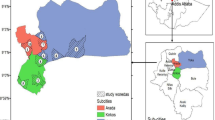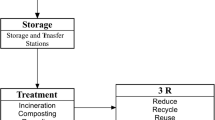Abstract
Worldwide solid waste generation is nearly 1.3 billion tonnes/year, whereas in India 62 million tonnes of solid waste is generated per year by 377 million urban people. The increasing amount of solid waste in India, nearly 50% of which is organic matter, is the major concern for treatment and waste management. Several technologies are already in practice for the treatment of organic fraction of municipal solid waste (OFMSW) in India. It is important to assess the sustainability of these processes. In this study, the existing OFMSW technologies in India were examined. Case-study approach was taken for this purpose along with some published secondary reports. It was found that the selection of technology quite depends on the composition of the OFMSW. Food waste rich fractions are recommended for biomethanation, whereas the fractions rich in market waste and household waste are suitable for composting. Fractions rich in lignin and lignocellulosic materials are suitable for pyrolysis and gasification, whereas the rejects are to be sent for RDF preparation. Based on the findings, a sustainable framework has also been proposed, implementation of which may result in better waste management.








Similar content being viewed by others
References
Solid Waste Management Rules (2016) Ministry of Environment, Forest and Climate Change, Government of India, The Gazette of India: Extraordinary, New Delhi. http://www.moef.gov.in/sites/default/files/SWM%202016.pdf
Vaish B, Srivastava V, Singh P, Singh A, Singh PK, Singh RP (2016) Exploring untapped energy potential of urban solid waste. Energy Ecol Environ 1(5):323–342
WHAT A WASTE—A Global Review of Solid Waste Management Urban Development & Local Government Unit (2012) World bank. http://siteresources.worldbank.org/INTURBANDEVELOPMENT/Resources/336387-1334852610766/What_a_Waste2012_Final.pdf. Accessed 24 Apr 2017
Census (2011) Ministry of Home Affairs, Government of India. http://censusindia.gov.in/. Accessed 24 Apr 2017
Statistical Year Book India (2016) Area and population. The ministry of statistics and programme implementation. Government of India. http://www.mospi.gov.in/statistical-year-book-india/2016. Accessed 24 Apr 2017
World Statistics Pocketbook (2016) Department of Economic and Social Affairs; Statistics Division, United Nations, New York. http://www.mospi.gov.in/statistical-year-book-india/2016. Accessed 10 May 2017
Bhat PNM (2016) Research project on India—Demographic Scenario-2025. Institute of Economic Growth, Delhi. http://planningcommission.nic.in/reports/sereport/ser/vision2025/demogra.pdf. Accessed 8 June 2017
Joshi R, Ahmed S (2016) Status and challenges of municipal solid waste management in India: a review. Cogent Environ Sci 2:1139434
Planning Comission Report (2014) Report of the task force on waste to energy (vol I) (in the context of integrated MSW management). Government of India. http://planningcommission.nic.in/reports/genrep/rep_wte1205.pdf. Accessed 11 May 2017
Javadekar (2016) Solid waste management rules revised after 16 years; rules now extend to urban and industrial areas. Press Information Bureau, Ministry of Environment and Forests, Government of India. http://pib.nic.in/newsite/PrintRelease.aspx?relid=138591. Accessed 3 June 2017
Sustainable Solid Waste Management in India: Report (2012) Earth Engineering Centre (EEC), Columbia University and Waste-to-Energy Research and Technology Council (WTERT). http://www.seas.columbia.edu/earth/wtert/sofos/Sustainable%20Solid%20Waste%20Management%20in%20India_Final.pdf. Accessed 11 May 2017
Hosetti BB (2006) Prospects and perspective of solid waste management. New Age International. Chap. 1, Solid waste management: general aspects. http://www.newagepublishers.com/samplechapter/001164.pdf. Accessed 27 Apr 2017
Swachh Bharat Mission (2016) Municipal solid waste management manual. Ministry of Urban Development, Government of India. http://moud.gov.in/pdf/584e4b8b1e3da584e4a5c4a867Book2.pdf. Accessed 9 June 2017
Sharholy M, Ahmad K, Mahmood G, Trivedi RC (2008) Municipal solid waste management in Indian cities e a review. Waste Manag 28(2):459–67
Agrawal A, Pandey R, Agrawal ML (2015) Seasonal variation in composition and characteristics of Indian municipal solid waste—a case study. Recent Res Sci Technol 5(5):40–43
Proposed Action Plan for MSW Management (In accordance with the Solid Wastes Management Rules, 2016) (2015) The National Action Plan for Municipal Solid Waste Management; CPCB, 2015, New Delhi, India. http://cpcb.nic.in/wast/municipalwast/Action_plan.pdf. Accessed 10 May 2017
Nixon JD, Wright D, Dey PK, Scott JA, Sagi S, Ghosh SK (2015) Issues and challenges of implementing waste-to-energy practices in India. Renew Energy Ser Mankind I:65–74
Kalyani KA, Pandey KK (2014) Waste to energy status in India: a short review. Renew Sustain Energy Rev 31:113–120
Nixon JD, Dey PK, Ghosh SK, Davies PA (2013) Evaluation of options for energy recovery from municipal solid waste in India using the hierarchical analytical network process. Energy 59:215–223
Gupta N, Yadav KK, Kumar V (2015) A review on current status of municipal solid waste management in India. J Environ Sci 37:206–217
Kumar A, Kumar N, Baredar P, Shukla A (2015) A review on biomass energy resources, potential, conversion and policy in India. Renew Sustain Energy Rev 45:530–539
Joseph K (2014) Municipal solid waste management in India. In: Pariatamby A, Tanaka M (eds) Municipal solid waste management in Asia and the Pacific Islands challenges and strategic solutions, Environmental Science and Engineering, Springer
Mata-Alvarez J (ed) (2003) Biomethanization of the organic fraction of municipal solid wastes. IWA Publishing, London
Meynell PJ (1976) Methane. Planning a digester. Prison Stable Court. Clarington, Dorset. http://www.scirp.org/(S(351jmbntvnsjt1aadkposzje))/reference/ReferencesPapers.aspx?ReferenceID=1437259. Accessed 8 June 2017
TERI’s Enhanced Acidification and Methanation Technology. http://www.teriin.org/technology/methanation-technology. Accessed 23 Apr 2017
Types of Biogas Plants A total of seven different types of biogas plant have been officially recognised by the MNES-SGP India. The Ministry of New and Renewable Energy (MNRE). http://www.sgpindia.org/documents/biogas_plants.pdf. Accessed 24 Apr 2017
Teri’s Enhanced Acidification and Methanation (TEAM): smart way to convert MSW to energy”-Report. The Energy Research Institute, Manufactured By: Om Energy Saving Systems Pvt Ltd. Bangalore. https://3.imimg.com/data3/FV/MR/MY-2118640/bio-gas-plant.pdf. Accessed 24 Apr 2017
CPCB Bulletin (2016) Vol.-I, July 2016, Government of India. http://www.cpcb.nic.in/upload/Latest/Latest_123_SUMMARY_BOOK_FS.pdf. Accessed 8 June 2017
National Institution for Transforming India Aayog (2014) Annual report 2014–15. Planning Commission, Delhi, Government of India. http://niti.gov.in/writereaddata/files/document_publication/Niti_annual_report-2014-15.pdf. Accessed 8 June 2017
Chandrappa R, Das DB (2012) Solid waste management principles and practice. Springer, Berlin Heidelberg
Devi KS, Swamy AVVS, Nilofer S (2016) Municipal solid waste management in India—an overview. Asia Pac J Res 1:118–126
Chattopadhyay S, Dutta A, Ray S (2009) Municipal solid waste management in Kolkata, India—a review. Waste Manag 29(4):1449–1458
Tchobanoglous G, Kreith F (eds) (2002) Handbook of solid waste management. McGraw-Hill Companies, New York
Higman C, van der Burgt MJ (2008) Gasification. Elsevier, Amsterdam
Tiwari GN, Mishra RK (2012) Advanced renewable energy sources. Royal Society of Chemistry, London
Ahsan N (1999) Solid waste management plan for Indian megacities. Indian J Environ Prot 19:90–95
Dhingra S (2015) Biomass gasifiers in India’s micro, small and medium enterprises (MSME) and rural electricity access: experiences and opportunities. Economic Sustainability: The Energy and Resources Institute TERI, India
Biomass Gasification. http://mnre.gov.in/schemes/grid-connected/biomass-gasification/. Accessed 24 Apr 2017
Nixon JD, Dey PK, Ghosh SK (2017) Energy recovery from waste in India: an evidence-based analysis. Sustain Energy Technol Assess 21:23–32
Gesellschaft D, Schenk B, Pravinjith KP (2010) Status paper on utilisation of refuse derived fuel (RDF) in India. The Deutsche Gesellschaft für Internationale Zusammenarbeit (GIZ) GmbH under the Indo German Environment Partnership (IGEP), Solid Waste Management and Environmental Strategies (P)Ltd. http://www.igep.in/live/hrdpmp/hrdpmaster/igep/content/e54413/e54441/e61172/e61173/20130425_RDFstatuspaper_final4.pdf. Accessed 12 June 2017
Hyderabad Integrated MSW Limited (A wholly owned subsidiary of REEL). Integrated MSW projest of GHMC being implementes under PPP model. http://www.unipune.ac.in/snc/school_of_energy_studies/es_webfiles/pdf/conference_summary/it/MrVarun_Boralkar.pdf. Accessed 25 Apr 2017
List of Project Developers. Addresses of the Project Developers of Municipal Solid Waste Based Power Projects. New & Renewable Energy Development Corporation of Andhra Pradesh Ltd. http://nredcap.in/ListofProjectDevelopers.aspx. Accessed 24 Apr 2017
India Geographical Map. https://www.hciseychelles.com/pdf/India_Poltical_Map.pdf. Accessed 2 Nov 2017
Bolin L, Lee HM, Lindahl M (2009) LCA of biogas through anaerobic digestion from the organic fraction of municipal solid waste (OFMSW) compared to incineration of the waste. In 6th International Symposium on Environmentally Conscious Design and Inverse Manufacturing, EcoDesign 2009, 6–9 December in Sapporo, Japan
Carballa M, Duran C, Hospido A (2011) Should we pretreat solid waste prior to anaerobic digestion? An assessment of its environmental cost. Environ Sci Technol 45(24):10306–10314
Andersen JK, Boldrin A, Christensen TH, Scheutz C (2010) Greenhouse gas emissions from home composting of organic household waste. Waste Manag 30(12):2475–2482
Martínez-Blanco J, Muñoz P, Antón A, Rieradevall J (2009) Life cycle assessment of the use of compost from municipal organic waste for fertilization of tomato crops. Resour Conserv Recycl 53(6):340–351
Komakech AJ, Zurbrügg C, Miito GJ, Wanyama J, Vinnerås B (2016) Environmental impact from vermicomposting of organic waste in Kampala, Uganda. J Environ Manag 181:395–402
Wang H, Wang L, Shahbazi A (2015) Life cycle assessment of fast pyrolysis of municipal solid waste in North Carolina of USA. J Clean Prod 87:511–519
Zaman AU (2013) Life cycle assessment of pyrolysis–gasification as an emerging municipal solid waste treatment technology. Int J Environ Sci Technol 10(5):1029–1038
Case Study for a 10 kWe Biomass Gasifier Power System Installed at Deodhara, Orissa (2006) The Energy & Resources Institute (TERI), December 2006. http://www.cosmile.org/doc/BioGasi_Deodarah.pdf. Accessed 9 June 2017
Case Study on Distributed Decentralised Generation Based Biomass Gasifier System at Jamera (District Korba), Chhattisgarh (2007) The Energy & Resources Institute (TERI), New Delhi December 2007. http://www.cosmile.org/doc/JameraPG.pdf. Accessed 9 June 2017
Khoo HH (2009) Life cycle impact assessment of various waste conversion technologies. Waste Manag 29(6):1892–1900
Carpentieri M, Corti A, Lombardi L (2005) Life cycle assessment (LCA) of an integrated biomass gasification combined cycle (IBGCC) with CO2 removal. Energy Convers Manag 46(11):1790–1808
Clean Development Mechanism (2006) Project Design Document Form (CDM-PDD).Version 03—in effect as of: 28 July 2006. https://cdm.unfccc.int/Reference/PDDs_Forms/PDDs/PDD_form04_v03_2.pdf. Accessed 9 June 2017
Reza B, Soltani A, Ruparathna R, Sadiq R, Hewage K (2013) Environmental and economic aspects of production and utilization of RDF as alternative fuel in cement plants: a case study of Metro Vancouver Waste Management. Resour Conserv Recycl 81:105–114
Acknowledgements
The author acknowledges the support of International Society of Waste Management, Air and Water (ISWMAW); Centre for Quality Management Systems (CQMS) Jadavpur University, 5th IconSWM and 4th 3RINCs for organizing the field trips.
Author information
Authors and Affiliations
Corresponding author
Rights and permissions
About this article
Cite this article
Ghosh, A., Debnath, B., Ghosh, S.K. et al. Sustainability analysis of organic fraction of municipal solid waste conversion techniques for efficient resource recovery in India through case studies. J Mater Cycles Waste Manag 20, 1969–1985 (2018). https://doi.org/10.1007/s10163-018-0721-x
Received:
Accepted:
Published:
Issue Date:
DOI: https://doi.org/10.1007/s10163-018-0721-x




